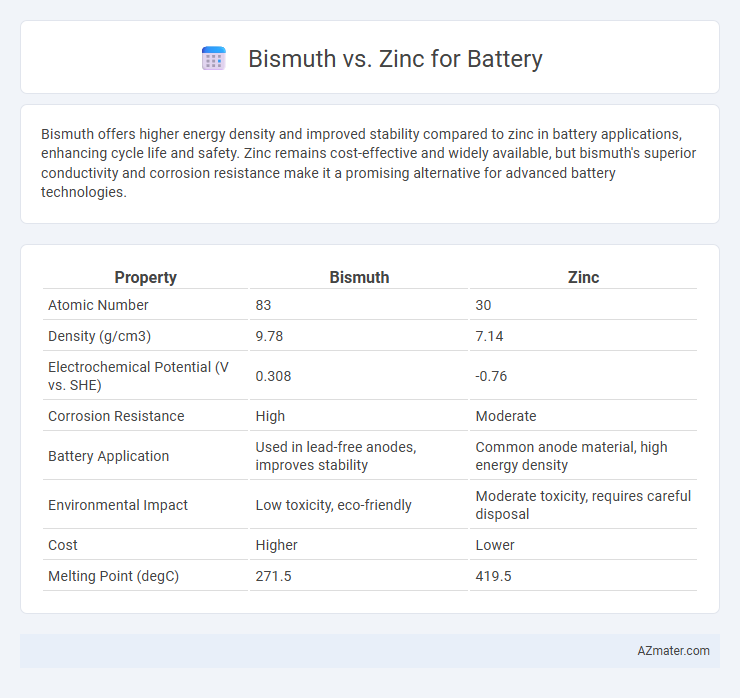Bismuth offers higher energy density and improved stability compared to zinc in battery applications, enhancing cycle life and safety. Zinc remains cost-effective and widely available, but bismuth's superior conductivity and corrosion resistance make it a promising alternative for advanced battery technologies.
Table of Comparison
| Property | Bismuth | Zinc |
|---|---|---|
| Atomic Number | 83 | 30 |
| Density (g/cm3) | 9.78 | 7.14 |
| Electrochemical Potential (V vs. SHE) | 0.308 | -0.76 |
| Corrosion Resistance | High | Moderate |
| Battery Application | Used in lead-free anodes, improves stability | Common anode material, high energy density |
| Environmental Impact | Low toxicity, eco-friendly | Moderate toxicity, requires careful disposal |
| Cost | Higher | Lower |
| Melting Point (degC) | 271.5 | 419.5 |
Introduction to Bismuth and Zinc in Batteries
Bismuth and zinc are emerging as promising materials in battery technology due to their unique electrochemical properties. Bismuth offers excellent stability and high volumetric capacity, making it suitable for anodes in rechargeable batteries, while zinc is widely used for its low cost, safety, and high theoretical capacity in aqueous and alkaline battery systems. Both elements contribute to advancements in energy storage solutions by enhancing battery efficiency, cycle life, and sustainability.
Chemical Properties: Bismuth vs Zinc
Bismuth exhibits low electrical conductivity and high corrosion resistance, making it stable in battery electrolytes but less efficient for electron transfer compared to zinc. Zinc has superior electrical conductivity and participates readily in redox reactions, which enhances its performance as an anode material in batteries. The chemical stability of bismuth reduces dendrite formation risks, while zinc's higher reactivity can lead to challenges like corrosion and dendrite growth during battery cycling.
Electrochemical Performance Comparison
Bismuth electrodes exhibit higher volumetric capacity and improved cycle stability compared to zinc in battery applications due to their lower tendency for dendrite formation and enhanced electrochemical reversibility. Zinc batteries offer higher current density and cost-effectiveness but suffer from hydrogen evolution and shape change during cycling, reducing overall electrochemical performance. The superior corrosion resistance and stable redox potential of bismuth contribute to better Coulombic efficiency and longer battery lifespan in aqueous and semi-solid-state systems.
Environmental Impact and Sustainability
Bismuth-based batteries offer a more environmentally friendly alternative to zinc by utilizing non-toxic and abundant materials that reduce heavy metal pollution and facilitate safer recycling processes. Zinc batteries, while cost-effective and widely used, pose challenges with their extraction and disposal due to potential soil and water contamination from zinc mining and electrode degradation. Evaluating sustainability, bismuth's low toxicity and better recyclability contribute to lower carbon footprints and enhanced long-term environmental compatibility compared to traditional zinc-based systems.
Cost and Resource Availability
Bismuth batteries typically have higher material costs due to bismuth's relative scarcity compared to zinc, which is abundant and widely available globally. Zinc's low cost and extensive supply chain make it a more economical choice for large-scale battery production. Resource availability for zinc supports sustainable manufacturing, while bismuth remains a niche option with limited widespread use in batteries.
Safety and Toxicity Considerations
Bismuth offers superior safety and lower toxicity compared to zinc when used in batteries, as it is non-toxic and environmentally benign, reducing health risks during manufacturing and disposal. Zinc batteries, while more common and cost-effective, pose greater safety concerns due to the potential for hydrogen gas release and zinc dendrite formation, which can lead to short circuits and battery failure. Consequently, bismuth-based batteries are increasingly favored in applications demanding safer and more environmentally sustainable energy storage solutions.
Applications in Modern Battery Technologies
Bismuth and zinc offer distinct advantages in modern battery technologies, with bismuth primarily used in lead-acid battery electrodes to enhance corrosion resistance and prolong lifespan, while zinc serves as a crucial anode material in zinc-air and zinc-ion batteries known for high energy density and cost-effectiveness. Zinc-based batteries are increasingly favored for grid storage and electric vehicles due to their abundant resources and environmental safety, whereas bismuth enhances battery stability and efficiency in industrial and stationary energy storage applications. Innovations in zinc battery chemistries are driving advancements in rechargeable, flexible, and wearable electronics, whereas bismuth applications focus on improving thermal stability and reducing degradation in traditional battery systems.
Lifespan and Efficiency of Bismuth and Zinc Batteries
Bismuth-based batteries exhibit longer lifespan due to their enhanced stability and resistance to corrosion compared to zinc batteries, which often suffer from dendrite formation leading to capacity loss. Zinc batteries provide high energy density and efficient charge-discharge cycles but typically face reduced cycle life and efficiency because of zinc's tendency to degrade during repeated use. Optimization of bismuth electrodes in battery systems enhances efficiency by minimizing side reactions, whereas zinc batteries require advanced electrolyte formulations to improve their lifespan and maintain consistent performance.
Recent Innovations and Research
Recent innovations in battery technology highlight bismuth's potential as a safer, more environmentally friendly alternative to zinc due to its higher volumetric capacity and stability in aqueous electrolytes. Research on zinc batteries focuses on improving cycle life and dendrite suppression through advanced electrolyte formulations and nanostructured electrodes. Emerging studies reveal bismuth-based anodes enhance energy density and mitigate corrosion issues, positioning bismuth as a promising candidate for next-generation energy storage solutions.
Future Prospects: Bismuth or Zinc for Next-Gen Batteries
Bismuth offers promising advantages for next-gen batteries due to its non-toxic nature, high stability, and efficient energy storage capacity, making it a sustainable alternative to traditional materials. Zinc's abundance, low cost, and excellent electrochemical properties support its continued dominance in large-scale, high-capacity battery applications. Future battery technologies are expected to leverage zinc for commercial scalability while exploring bismuth to enhance performance, lifespan, and environmental safety in specialized energy storage systems.

Infographic: Bismuth vs Zinc for Battery
 azmater.com
azmater.com